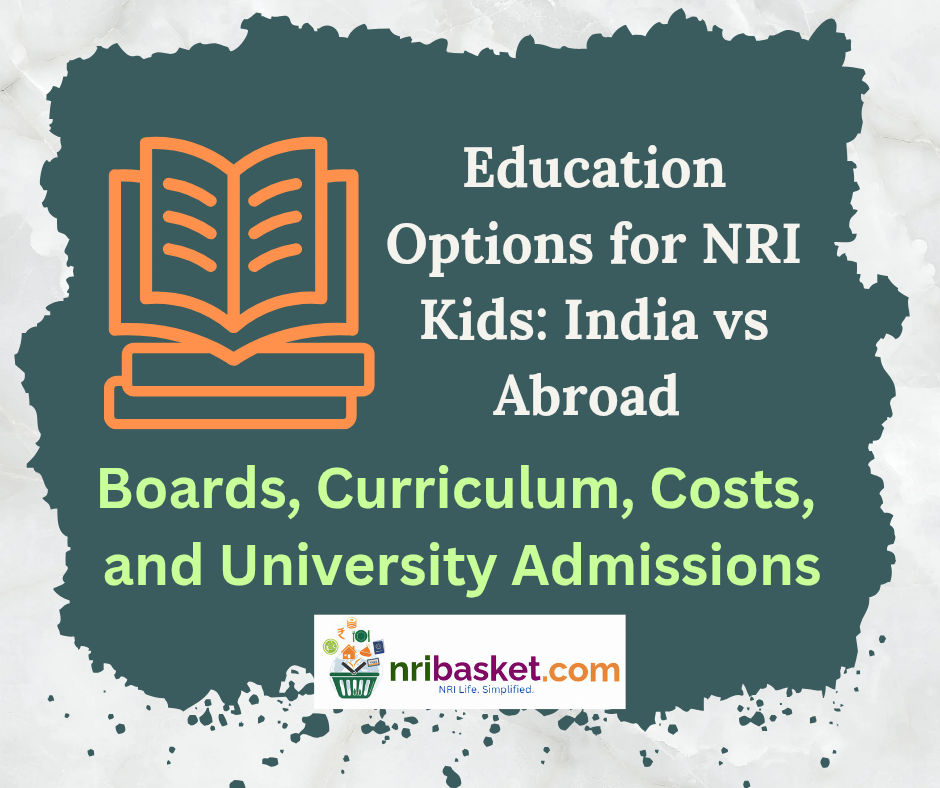
Education in india for Nri kids
Choosing the right education path for NRI children is one of the most important decisions parents make. With options in India and abroad, including different boards, curricula, and universities, understanding each choice is crucial. This guide covers school boards, university admissions, costs, flexibility, cultural exposure, and career outcomes to help parents make informed decisions for their children.
Long Answer: NRI parents can choose CBSE or ICSE for structured Indian curricula, or state boards for regional focus. International boards like IB and IGCSE provide global education and flexibility, ideal for students aiming for universities abroad. Choice depends on future study goals and exposure to international standards.
Long Answer: Schools abroad encourage critical thinking, creativity, and extracurricular development. They follow IB, American, or British curricula, preparing students for global universities. Indian education is more structured, exam-focused, and suitable for students aiming for Indian competitive exams or universities.
Long Answer: CBSE suits children planning higher education in India and competitive exams. IB promotes independent thinking, research, and holistic skills, better for students aiming at international universities. Parents should consider future university goals and learning style.
Long Answer: Indian universities focus on board exam results and entrance exams like JEE or NEET. Abroad, universities evaluate academic records, standardized tests, personal statements, and extracurricular achievements. IB or international curricula provide advantages for foreign admissions.
Long Answer: Parents should assess the child’s higher education plans, learning preferences, social adaptation, and financial resources. Indian education suits exam-focused students, while abroad education offers flexibility, creativity, and global exposure.
Long Answer: International schools in India offer global curricula such as IB and IGCSE, providing international teaching standards and exposure. These schools help children adapt to foreign education systems and prepare for overseas university admissions.
Long Answer: Indian boards like CBSE have fixed subjects and standardized assessments. Abroad, IB, American, and British curricula allow students to select subjects aligned with interests, including arts, sciences, and interdisciplinary projects. Flexibility helps children develop skills suited to their future careers.
Long Answer: CBSE and ICSE schools are generally affordable compared to international schools. IB or IGCSE schools in India are more expensive due to global curriculum and teaching standards. Parents should consider tuition, transportation, and extracurricular fees.
Long Answer: Education abroad includes tuition fees, boarding, health insurance, visa expenses, and living costs. Countries like the USA, UK, and Australia have higher costs, while some European countries offer affordable education. Scholarships and financial aid can help reduce expenses.
Long Answer: NRI students can apply for scholarships in private schools, international schools, and Indian universities. Merit-based scholarships reward academic excellence, while need-based aid considers family financial background. Some states also provide education grants for NRI children.
Long Answer: Many universities abroad provide financial aid for NRI students, including full or partial tuition coverage. Scholarships may be merit-based, need-based, or awarded for specific skills, sports, or community involvement. Early planning and strong academic records increase eligibility.
Long Answer: Foreign schools integrate arts, sports, leadership, and community service into the curriculum. Indian schools provide extracurriculars but focus mainly on academics. Active participation abroad can strengthen university applications and personal development.
Long Answer: Moving abroad exposes children to different cultures, educational expectations, and peer groups. Parents should prepare children with cultural awareness, language skills, and social support to ensure smooth adaptation and emotional well-being.
Long Answer: English proficiency affects academic performance, social integration, and exam success abroad. NRI children should strengthen reading, writing, speaking, and comprehension skills. Schools may provide language support programs for smoother adaptation.
Long Answer: Indian education prepares students for Indian universities, competitive exams, and domestic job markets. Studying abroad provides exposure to international companies, global networking, and diverse career paths. Parents should align education choices with long-term career plans.
Long Answer: Indian education focuses on lectures, exams, and memorization. International schools emphasize inquiry-based learning, projects, discussions, and critical thinking. Student-centered approaches encourage independent problem-solving and creativity.
Long Answer: Switching from CBSE to IB or vice versa involves changes in teaching style, assessment methods, and subject choices. Parents should plan carefully, considering transition time, syllabus differences, and academic preparedness.
Long Answer: Early exposure helps children develop language proficiency, cultural awareness, problem-solving skills, and familiarity with diverse academic expectations. This prepares them for global university admissions and career opportunities.
Long Answer: Homeschooling offers flexibility and customized learning. NRI parents can follow CBSE, IB, or international curricula at home. Extracurricular activities and social exposure should be included to ensure holistic development.
Long Answer: Indian boards rely on periodic exams, tests, and memorization. International boards like IB emphasize internal assessments, projects, presentations, and critical analysis. Continuous assessment develops analytical thinking and real-world problem-solving skills.
Long Answer: NRI kids may struggle with local language subjects, strict exam-focused teaching, and adapting to Indian classroom culture. Support from teachers and peer interaction can help overcome these challenges.
Long Answer: Adapting to new teaching styles, social norms, and living independently can be difficult. Strong language skills, emotional support, and involvement in school activities ease the transition.
Long Answer: NRI students must meet eligibility criteria and prepare for competitive exams. Board marks influence ranking, while dedicated coaching can enhance performance.
Long Answer: Standardized tests assess academic readiness and language proficiency. Each country and university has specific requirements. Early preparation helps achieve competitive scores and successful admission.
Long Answer: Dual curricula enable students to experience CBSE or ICSE alongside IB or IGCSE, providing flexibility for future university options in India or abroad. This approach balances structured learning with global exposure.
Long Answer: Studying with motivated peers enhances learning, participation, and cultural adaptation. Parents should encourage social interactions, teamwork, and group activities to build confidence and collaborative skills.
Long Answer: Parents can provide exposure to foreign languages, technology, diverse cultures, and critical thinking exercises. Familiarity with project-based learning and independent study prepares children for international curricula and university demands.
Long Answer: Completing schooling in India benefits students aiming for Indian universities and competitive exams. Studying abroad offers international exposure, flexibility, and global career opportunities. Parents should weigh academic, social, financial, and personal development factors.
Long Answer: Digital tools, e-learning platforms, and virtual classrooms support both Indian and international curricula. Technology enables access to global resources, interactive learning, and remote education, crucial for NRI children with changing locations.
Above post explained about NRI kids education, CBSE, IB, international schools, university admissions, India vs abroad education, NRI parents guide, study abroad, scholarships for NRI kids and education costs.if you have more questions why not pop in comments below.





